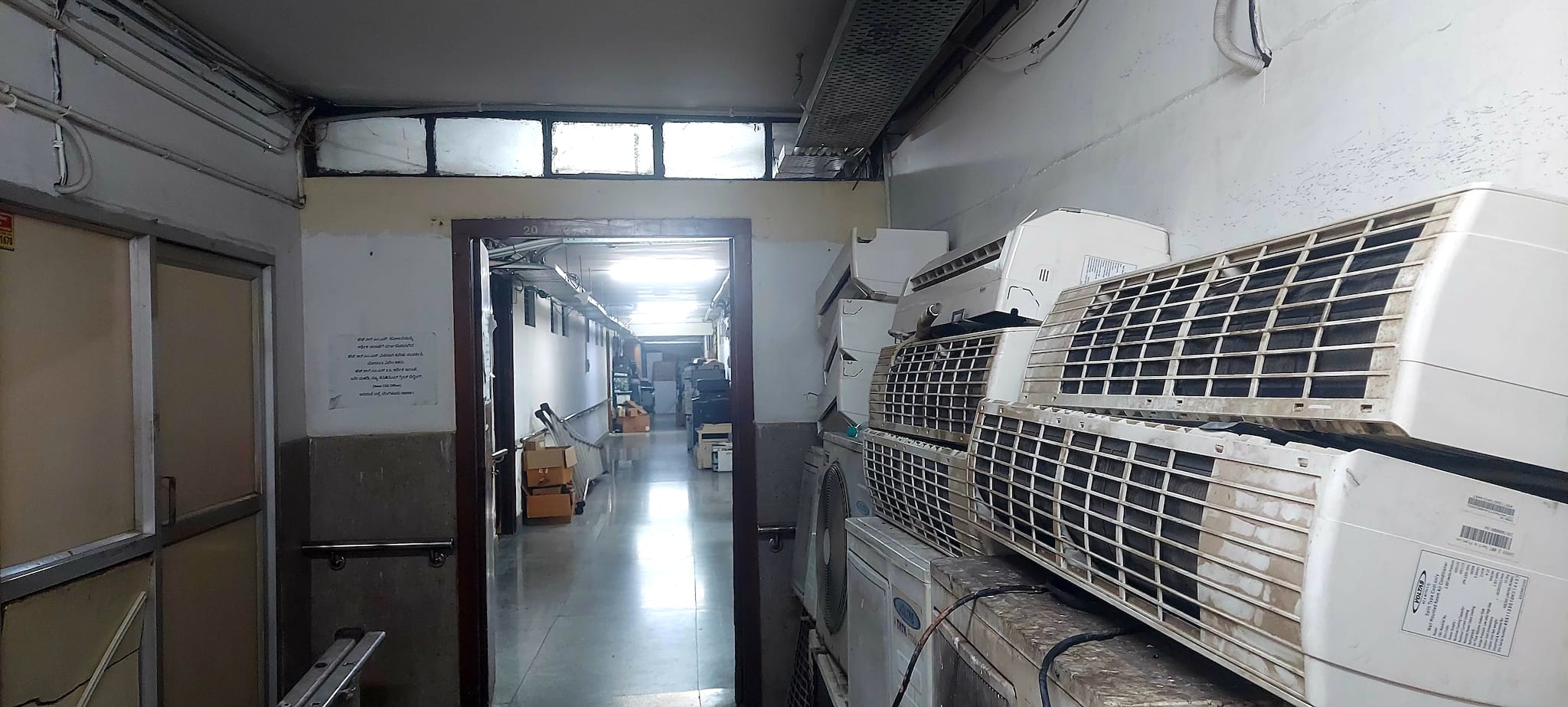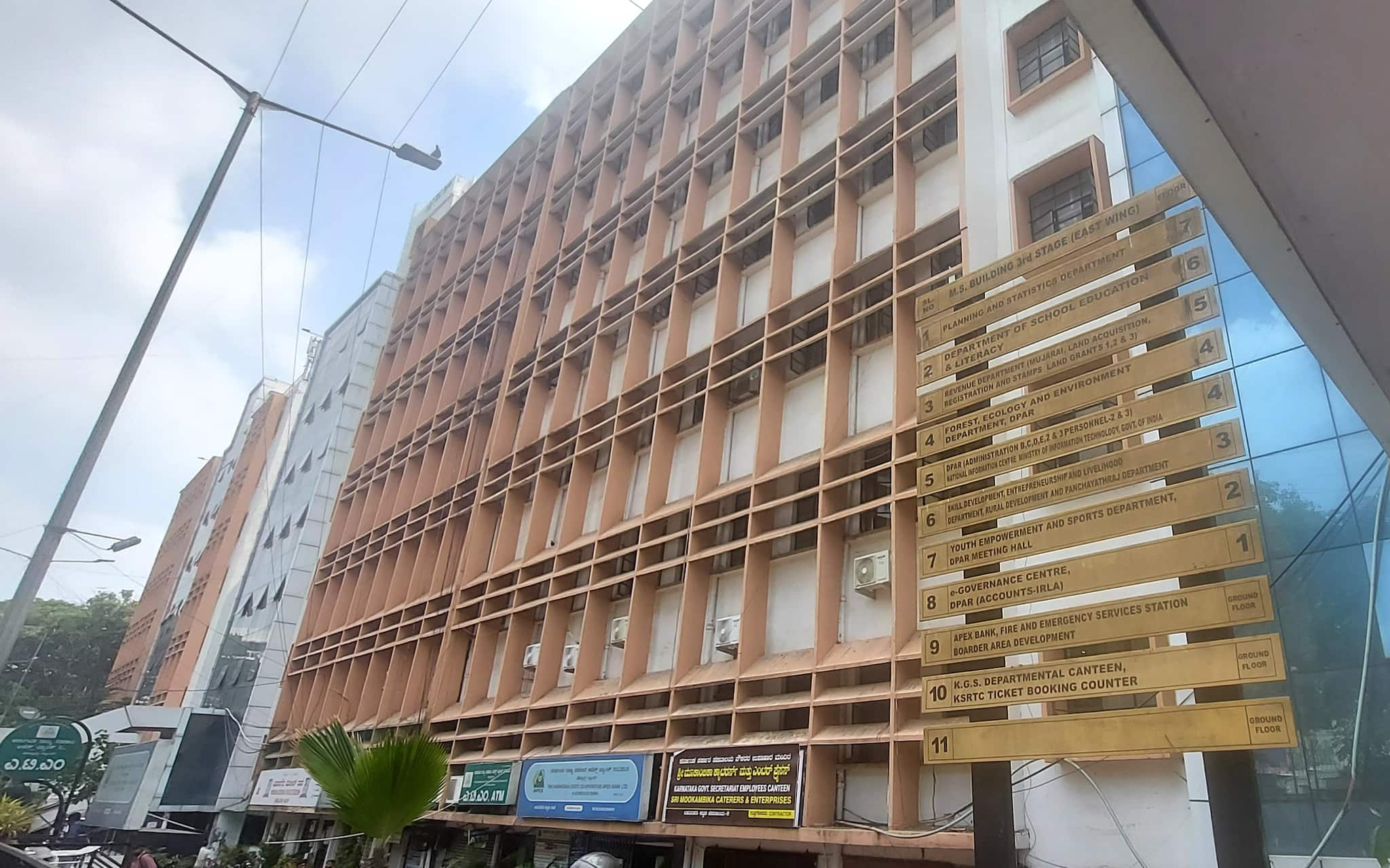



On the dimly-lit ground floor of Bengaluru’s Multi-Storey Building (MS Building)—home to several prominent government offices near Vidhana Soudha—a quiet digital revolution is underway.
This five-decade-old structure, long plagued by space constraints, now hosts Karnataka’s AI nerve centre: the Artificial Intelligence–Machine Learning (AI-ML) Cell.
Operating under the Centre for e-Governance (CeG) within the Department of Personnel and Administrative Reforms (DPAR), the 12-member AI-ML Cell is shaping the state’s next chapter in digital governance.
From an AI-based attendance system to chatbots for public grievances, the Cell is piloting tech solutions for improving governance. A recent government order now mandates that all departments consult the cell before launching AI initiatives.
Also, read: Karnataka: Govt departments need AI cell nod for artificial intelligence projects
“We are among the first states to adopt AI. We’re exploring its use in governance and have also proposed additional grants to expand the AI Cell,” Dileesh Sasi, CEO, CeG, told Moneycontrol.
"The cell is developing AI-based solutions using Computer Vision, Natural Language Processing (NLP), Large Language Models (LLMs), and other AI technologies. This will strengthen AI-driven governance" he said.

“We’re one of the few states with a dedicated AI-ML Cell—alongside Telangana, Punjab, and Tamil Nadu,” Shreevyas H M, project director of AI-ML Cell, told Moneycontrol. “We advise departments on ethical use, policy alignment, and best practices.”
Also, read: Body cameras, facial recognition, analytics: Govt institutions tap AI to fight exam cheating
He said that AI adoption involves handling sensitive personal data. “We are centralising efforts to ensure data security, prevent duplication, enable resource sharing, and reduce costs,” he added.
AI-powered attendance systemAmong the cell’s flagship initiatives is the selfie-based, AI-powered Karnataka Attendance Management System (KAAMS), which will soon be rebranded 'Kartavya' (meaning 'responsibility' in Kannada).
Also, read: Bengaluru water board to introduce AI-enabled smart water meters to curb revenue loss
The Health Department has already implemented a selfie-based attendance system, covering nearly 39,000 employees, as well as around 700 employees in the e-Governance Department across the state.
 AI-ML Cell
AI-ML Cell“Some employees are not using it yet. The iOS version will be launched soon for them. Other departments, including the Chief Minister’s Office, the Social Welfare Department, and others, are planning to adopt it. This will eventually cover 5 lakh government employees and about 15 lakh contractual staff in a phased manner,” said Shreevyas.
The app, which replaces biometric devices, uses Aadhaar-based eKYC and geofencing. Users mark attendance by clicking a selfie within 100 metres of their office.
“Biometric devices cost between Rs 10,000 and Rs 25,000 each and are usually installed only at head offices. Our app eliminates that cost and curbs impersonation and tampering,” he said.
“It also ensures privacy. Selfies aren’t stored, and the app doesn’t track user movement. Only attendance within the geofenced area is recorded,” he said.
Also, read: Karnataka Examinations Authority to deploy AI to prevent impersonation
The system enables real-time monitoring. “There was no centralised attendance tracking earlier. Now, even the Chief Secretary can view real-time data, including late arrivals,” he said. Reports can be generated daily, monthly, or by hours worked.
“This will also lead to cost savings. For instance, earlier, the Health Department used to spend Rs 2.5 crore on biometric devices. With this app, there’s no hardware or maintenance cost, and it provides a much wider coverage,” he added.
Also, read: Karnataka's heritage structures to join Metaverse; virtual tours soon
AI for searchable government ordersThe cell is also building an AI-based government order summary and information extraction tool which will facilitate officials and citizens to easily access information on government orders, policies and schemes.
Also, read: In a first, Karnataka police to deploy AI tools for fund trail analysis, dark web monitoring
“There’s no centralised repository for GOs, circulars, policies, notifications, etc., making access difficult even for officials,” said Shreevyas. “We’ve trained a language model on thousands of GOs. Users can now ask questions, such as whether a private hospital is empanelled, and get accurate answers with supporting documentation.”
 MS Building
MS BuildingThe system will soon be piloted in the departments of rural development and panchayat raj, finance, and agriculture, and will support both Kannada and English.
Also, read: AI Cops! Bengaluru police pilots AI-generated avatars for social media outreach
To support this, the cell has developed an Optical Character Recognition (OCR) engine capable of reading scanned documents in both languages. “Currently, departments scan GOs in varied formats—PDFs, JPEGs, etc. Our OCR model can read them. Going forward, GOs will be digitally signed and uploaded directly,” he said.
Initially, access will be restricted to government employees, with public access planned for later. “The more it’s used, the better the model will get,” he said. The platform—being built entirely in-house—will also host circulars, notifications, and policies.
Also, read: AI-powered mind reading: Women-only university in Karnataka targets early epilepsy detection
Smarter chatbots for citizen servicesThe AI-ML Cell is also developing intelligent chatbots for entities such as the Karnataka Examination Authority and SAKALA, which covers over 1,000 time-bound citizen services. “These are not rule-based bots, but AI-powered ones, which are more advanced. We can upload a one-page or a 1,000-page document, and the AI will answer questions based on its contents,” said Shreevyas. “It’s similar to our AI-GO model, but tailored for broader applications.”
AI for grievance redressal, fraud detectionAnother initiative in progress is the AI-driven integrated public grievance redressal system, IPGRS 2.0, to resolve public grievances. Citizens will be able to submit a photo or video—such as a pothole or water leak—and the AI will identify the issue, tag the relevant department, and alert the responsible officer. The service will be available on both mobile and web platforms.
Also read: AI-powered video surveillance to monitor inmates in Bengaluru Central Prison
The cell is also exploring AI for fraud detection in health schemes like Suvarna Arogya Suraksha, which helps low-income citizens access free hospital treatment. “We’ve seen cases of reused X-rays and inflated hospital stays. AI can flag these anomalies effectively,” said Shreevyas.
Also read: Bengaluru: BBMP to use AI to identify illegal constructions, says DK Shivakumar
Building AI skills and infrastructureThe cell is collaborating with the Karmayogi Mission, IIM-Bangalore, and the Wadhwani Foundation to enhance AI literacy among government staff.
“We’re creating tiered AI training programmes—for everyone from senior officers to clerical staff—focused on decision-making, automation, and efficiency. The aim is to reduce workload and improve service delivery,” he said.
Also read: Karnataka Budget: State bets big on Artificial Intelligence & Machine Learning
Shreevyas also noted the risks of AI misuse. “Some officers may unknowingly share sensitive data with public tools like ChatGPT. Our training will address such risks.”
Also, read: Karnataka launches AI-powered single window system for investors
To support innovation and collaboration with private entities and AI startups, the cell has partnered with the India AI Mission to procure Graphics Processing Units (GPUs) — critical for AI development. These GPUs will be offered to startups at subsidised rates: 40 percent funded by the Centre and 60 percent by the state.
“We’ve procured about 100 GPUs and can scale up to 1,000, based on demand,” he said. “Bengaluru is home to over 850 AI startups and 25 percent of India’s AI talent. This is a big opportunity for public-private collaboration.”
Also, read: Bengaluru Traffic Police to use AI for 13 different violations, up from seven
Towards a Centre of ExcellenceThe AI cell is now scouting a 10,000–15,000 sq ft space to set up a full-fledged Centre for AI Excellence.
“The new facility will bring together government, academia, and startups. Jointly funded by the Karnataka government and the Centre, it will serve as a resource hub for students and researchers,” Shreevyas said.
Also read: Karnataka Budget proposes AI Cell for governance, allocates Rs 50 Cr for Centre for Applied AI
Discover the latest Business News, Sensex, and Nifty updates. Obtain Personal Finance insights, tax queries, and expert opinions on Moneycontrol or download the Moneycontrol App to stay updated!
Find the best of Al News in one place, specially curated for you every weekend.
Stay on top of the latest tech trends and biggest startup news.